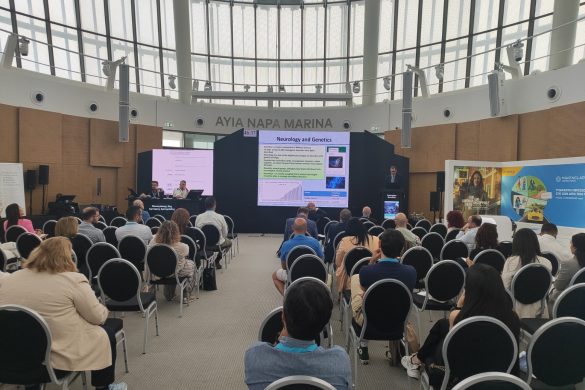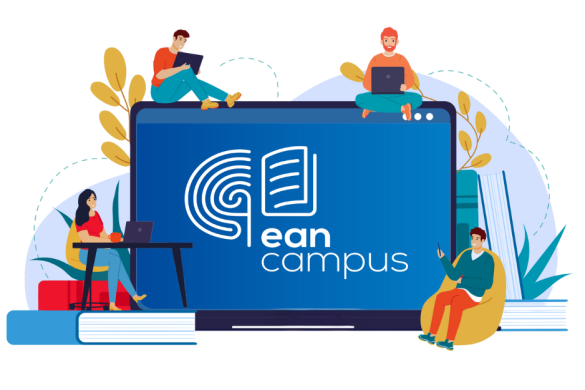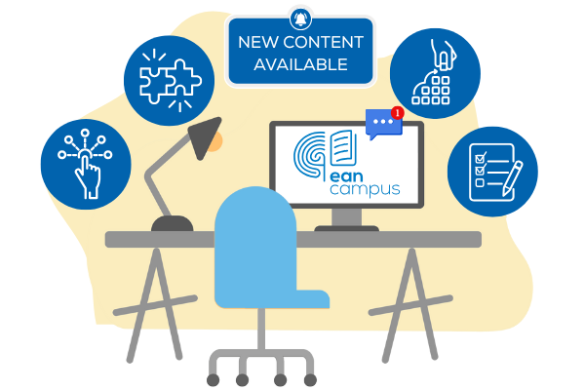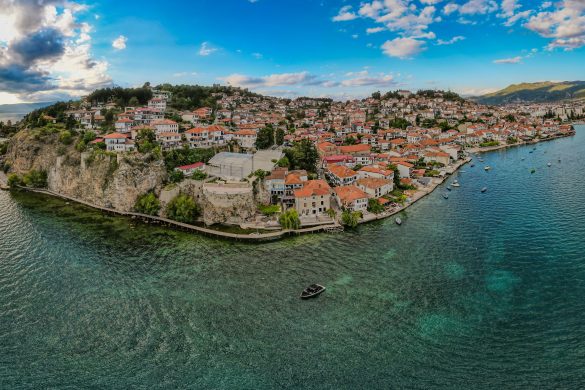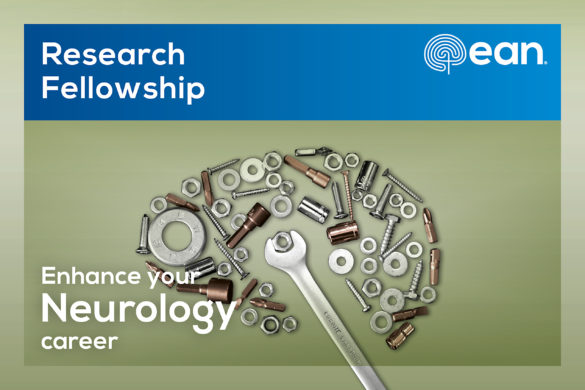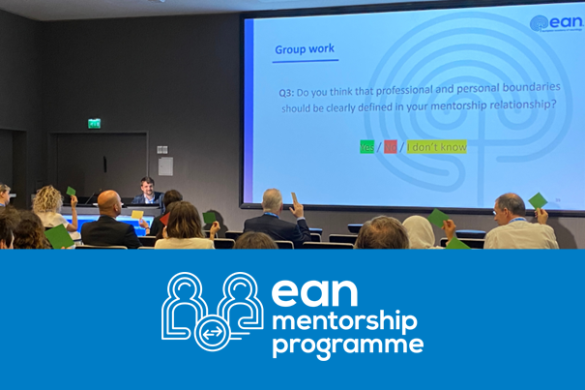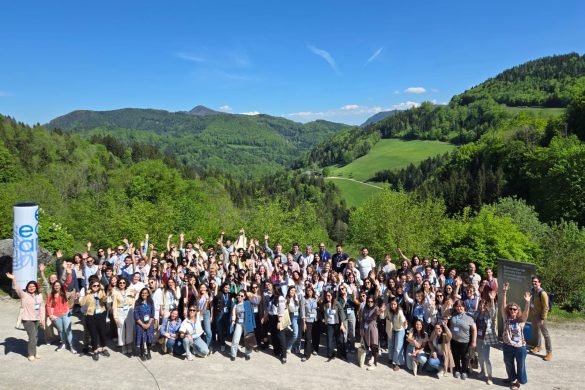Researching rare diseases – four months in Rotterdam
by Theresa Niedermeier
visiting the Erasmus Medical Center, Department of Clinical Genetics, from June to October 2022
In summer 2022, I spent four months at the Erasmus Medical Center in Rotterdam, the Netherlands. It is my great pleasure to report about this experience, enabled by the EAN Student Teaser Fellowship programme. The internship focused on the study of a rare developmental genetic disability called Angelman syndrome.
For me, this internship felt like coming full circle on my journey so far in the field of neuromedical research. My interest in this area was present from a young age, due to my sister being born with Angelman Syndrome. This disability led to her never passing the mental age of approximately one, never learning to speak, struggling with epilepsy, and needing assistance in every aspect of life. Wanting to understand more about the underlying biology brought me towards the elite master’s programme in Biomedical Neuroscience, where I learned a lot about neurological conditions in theory and practice. However, I always had an eye on the study of Angelman syndrome and the small number of laboratories around the world dedicated to it. Therefore, I was delighted to receive the opportunity to join the group of Prof. Ype Elgersma at the Department of Clinical Genetics for an internship and the chance to learn first-hand about research into the underlying mechanisms and treatment options.
During my stay under the supervision of Dr Edwin Mientjes I was able to improve my knowledge in genetic analysis, cloning, and expression of proteins important to the syndrome. Additionally, I was grateful to learn more about coding and machine learning analysis of behavioural data. The latter has enabled researchers to study high quantity data, such as videos of sleeping patients, or long-term EEG recordings, with high efficiency and accuracy. The environment at the clinic with the presence of a wide variety of research groups, but also a children’s hospital, enabled me to broaden my horizon tremendously through interdisciplinary talks and presentations.
Neurobiological research, while not always in direct patient contact, is an important pillar of neurology. My time at the Erasmus Medical Center showed me especially the importance that rare disease research has for patients and relatives of patients. During my internship I had the opportunity to join a conference dedicated to Angelman syndrome, attended by researchers, clinicians, and parents of affected children. The conversations showed how all sides can benefit from having input from one another and made me grateful about the opportunity to contribute from a position of intersection.
I would like to thank Prof. Elgersma for having me in his laboratory, an experience that will certainly stay with me and help me with my career decisions moving forward. Of course, I also want to mention all the amazing people I met during my time in Rotterdam. Thank you for your knowledge, patience, and kindness. Finally, I want to express my gratitude to the European Academy of Neurology for providing me with this exceptional opportunity.
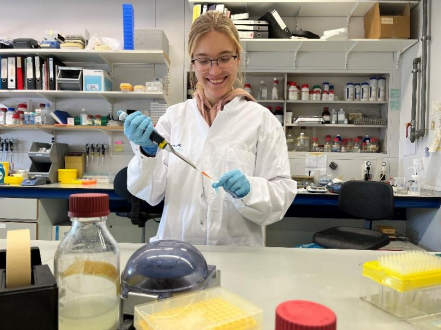
Report from 4 months in London
by Luisa Delazer
visiting the Department of Clinical and Experimental Epilepsy at the Queen Square Institute of Neurology, UCL in London in April-August 2022
In the summer semester 2022 I had the opportunity to spend four months on an EAN Student Teaser Fellowship at the Department of Clinical and Experimental Epilepsy at the Queen Square Institute of Neurology, UCL in London. In the first few weeks I followed my supervisor Prof. Matthias Koepp in his epilepsy clinics for adults and adolescents. In this time, I learned a lot about everyday problems of people with epilepsy and the different treatment options available. I profited not only from Prof Koepp’s profound knowledge about epilepsy but also from his social skills, treating people with epilepsy as partners in the process of treatment. It was also interesting to me how to handle deeply uncomfortable topics, such as SUDEP. Moreover, I got to observe the world-famous National Health Service with all the advantages and disadvantages it offers.
After these introductory weeks I was assigned my own research projects. I first started working on an imaging study on people with juvenile absence epilepsy and their siblings. As I had no experience of imaging studies before, I felt like I was solving riddles every day. This was challenging but I really enjoyed it.
In a second project, I was collecting data on how people with severe drug refractory epilepsy, living in a long-term care facility at Chalfont St. Peter, did during the COVID-19 pandemic. Since people with epilepsy are commonly assumed to be a group at risk, this was a very interesting question. Both imaging, and COVID-19 projects were very time consuming but fun and rewarding. I was allowed to present our new findings at the ILAE British Branch Meeting 2022 in Cardiff and at the German, Austrian, Swiss Epilepsy Congress 2023 in Berlin.
During my stay I joined many research meetings and discussions, which were very encouraging and inspiring for my own research. I was also allowed to join the famous Gowers clinical case discussions where each week a professor presented a case on his neurology specialty and a neurologist in training had to present his thoughts on diagnostic procedures and therapeutic steps. These lectures are very popular at UCL because they provide world-class neurological knowledge and profound clinical reasoning skills.
All in all, I learned a lot about treatment and clinical presentations of epilepsy and gained important research experience which I will profit from in the future. Besides that, I got to know fantastic people which made this stay even more unforgettable. I want to thank Prof. Matthias Koepp for his great hospitality and support, many hours of teaching, and his fantastic research ideas. I also want to thank all research fellows for helping me with questions and for many fun weekends.
Finally, I want to thank the EAN for their valuable support which made this great experience possible.
One month in the cradle of Neurology
by Giuseppe Cordasco visiting the Institut de la Mémoire et de la Maladie d’Alzheimer (Centre des Maladies Cognitives et Comportementales, Centre de Référence des Démences Rares et Précoce (DFT, APP, DCB, PSP), Centre de Référence des Malades d’Alzheimer, Pitié-Salpêtrière University Hospital in Paris, France in Nov-Dec 2022
It gives me great pleasure to report on the EAN Student Teaser Fellowship, that allowed me to stay one month in the Neurology Department of Pitié-Salpêtrière University Hospital in Paris. I had the opportunity to learn the global approach to the most challenging neurological disorders. In the Centre des Maladies Cognitives et Comportementales my daily activity was divided between the day-hospital division and the ambulatory care. During my stay I learnt the diagnostic flowchart in all his parts. The clinical activity during L’hospitalisation de jour was carried out by a multi-disciplinary team composed of neurologists, speech and language therapists, psychologists, neuropsychologists, nurses, and me. This approach to the patient allows a multidisciplinary assessment also using additional examinations (lumbar puncture, brain imaging, etc.). It astonished me how in a few weeks I learnt to interpret the results and became familiar with the neurologic examination. I also had the chance to follow psychological interviews, social assessments, speech therapy assessments, and I did a few neuropsychological tests. The outpatient procedure was also part of research protocols and clinical trials that were explained to me. During this period, I became aware of how to approach patients with different kinds of neurocognitive disorders and how to treat them, not only using a pharmacological treatment but also with rehabilitation programmes. Twice a week I joined Dr Dario Saracino for his outpatient activity. He was my mentor during my internship and every day he explained and taught me something new about neurology. Every Friday there was a discussion about a particular clinical case with all senior physicians and residents in which I participated.
It was an extremely formative experience, I had the opportunity to learn diagnostic and therapeutic protocols of common disease (as AD, LBD, FTD) but I was also able to discuss very rare neurological diseases. It is incredible how I acquired a great wealth of knowledge over a few weeks, that will remain lifelong.
I want to thank MD, PhD, PH, AP-HP Isabelle Le Ber for giving me the opportunity to stay in the Pitié-Salpêtrière University Hospital and to every single member of the team for always being available.
Special thanks to MD, PhD. Dario Saracino. I will always be grateful for your teachings and for showing me how to treat every single patient with kindness and professionalism.
I would like to express my thanks to the European Academy of Neurology for giving me the opportunity. These experiences have been and always will be precious moments of my life.
**************************
Visit the Student Teaser Fellowship website to find out more about this interesting opportunity for medical students. Interested applicants can get information about eligibility, how to apply with useful tips and FAQs, and how to become a student member including additional benefits when joining the EAN.
New application deadline is 31 March 2024
and the fellowship period is effective from 1 April 2024 – 31 January 2025.
The Student Teaser Fellowship is supervised and reviewed by the EAN Education Committee together with members of the Student Task Force




